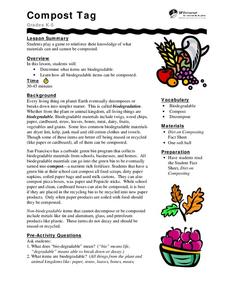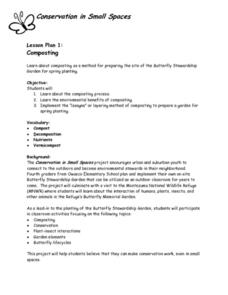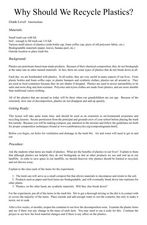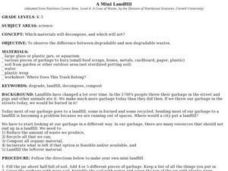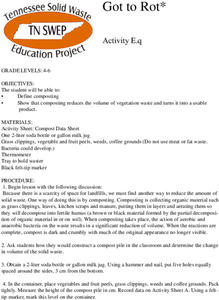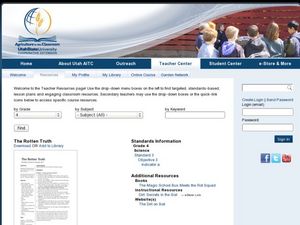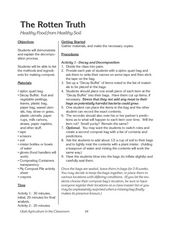Captain Planet Foundation
Worm Your Way Out of This
How can you provide healthy soil for your garden? Study worms, bacteria, and other microorganisms in a lesson about decomposition and organic compost. After discussing what you know about worms and watching a video, watch what worms do...
Captain Planet Foundation
Rotting Away
What happens at the end of a plant's life cycle? Show kids the natural way that plants show that they're decomposing, as well as the importance of compost, with a lesson about living organisms. After reading Log Cabin by Anne Schreiber,...
National Park Service
Reduce Our Carbon Footprint, Let’s Compost!
Roll up your sleeves and get a little dirty with this elementary and middle school compost instructional activity. All you need is a large plastic container, a couple old newspapers, some organic waste, and a few hundred worms and...
SF Environment
Compost Tag
Composting is a great way to get children involved in recycling. First, they discuss how biodegradable products decompose to make compost. Then, they talk about what can and cannot be composted. They play a game similar to around the...
SF Environment
Sort and Color!
Sorting is a very important skill that can be used in math and even science. Learners get familiar with some environmentally friendly vocabulary terms as they practice separating objects that can be recycled from those that can't. They...
Curated OER
Conservation in Small Places - Composting
A fabulous lesson introduces the art of composting to your gardeners. In it, youngsters learn about the composting process and how it actually works. They discuss the environmental benefits of composting, and use the "lasagna" method...
Curated OER
Soil Characteristics
Components of soil, such as inorganic or organic materials are detailed along with the main contributions of each. Deposits, weathering, and distinct types of characteristics and properties of soil classes are given.
Curated OER
Compost Lesson
If you are looking for how to introduce elementary environmentalists to the process of composting, here is a comprehensive outline for making it happen. The plan is to set this up at the beginning of a school year in order to observe the...
Curated OER
Garbage in the Garden
Students create their own compost. In this soil lesson, students fill a bag with waste and soil, in order to create a mini compost bin. Students observe the baggies over a 6 week period, they record their findings and collect data...
Curated OER
Vermicomposting
First graders investigate composting. For this biology lesson, 1st graders identify ways to use garbage as fertilizer. Students examine soil and compost matter as well as the role of worms in the dirt.
Curated OER
Life In the Soil: Home Sweet Home: Red Worms
In this soil worksheet, students complete 2 pages about the importance of soil in plant growth. Students read about red worms and answer 2 questions about composting. Students fill out a chart with their observations of plants planted in...
Curated OER
Compost in a Bag!
Fourth graders experiment to see which objects decompose. In this compost lesson, 4th graders observe the changes of labeled objects in a bag. Leave the objects for one month and record the changes by observation and weight. Students...
Curated OER
Now You See It, Now You Don't
Students explore organic and inorganic objects. In this environmental instructional activity students perform a composting experiment using flowers in different soils. Students record their observations.
Curated OER
Why Should We Recycle Plastics?
Students understand the value and harmful effects of plastics. In this plastics recycling lesson, students create a small compost bin that allows materials to return to the soil. Students explore what happens to the plastic in their...
Curated OER
Recycling
In this recycling worksheet, students sort a list of items as either trash or something that can be reused, recycled, or used in composting. This worksheet has 5 fill in the blanks in a chart.
Curated OER
A MINI LANDFILL
Students observe the difference between degradable and non-degradable wastes. They create their own landfill in a jar by adding four or five pieces of garbage and then covering it with dirt and water. They make observations on what they...
Curated OER
Got to Rot
Students make their own compost in a 2-liter jug and determine the actual volume loss in the composted material over a six-month period.
Curated OER
The Rotten Truth
Fourth graders investigate compost. In this Science activity, 4th graders take notes on the components of soil and its relation to plant growth. Students describe the steps in making compost.
Curated OER
Observing Compost Invertebrates
Second graders examine compost piles and what invertebrates help decompose the organic matter. In this compost invertebrates lesson students collect invertebrates found in a compost pile and examine them.
Curated OER
Collecting Compost
Students observe a composting box. In this soil activity, students create a composting bin by using a bin, newspaper, worms, and food scraps. Students create a composting food web.
Curated OER
The Rotten Truth: Healthy Food from Healthy Soil
Students investigate methods of decomposition in order to make compost. In this decomposition science lesson, students set up compost bags using food and materials which decay over time. The initial lesson is approximately 30 minutes,...
Curated OER
Let's make a landfill
Students create a mini-landfill. For this decomposing lesson, students differentiate between materials that decay from those that won't. Students identify the factors that might help materials from decomposing. Students record on a...
Curated OER
Recyclers Revisited
Fifth graders observe their plant experiments that they started in a previous lesson and examine the role of decomposers in the nitrogen cycle. Two weeks after they set up a worm terrarium, they analyze any changes they observe, and...
Curated OER
Are you going to eat that?
Students identify and define composting. STudents compare and contrast aerobic and anaerobic composting. Students illustrate the benefits of composting and other methods to reuse, recycle, reduce, and respond. Students identify through...





